

Insider GCSE creative writing tips + 106 prompts from past papers
by Hayley | Mar 9, 2023 | Exams , Writing | 0 comments
Are you feeling a little bit twitchy about your child’s English GCSE writing task?
Sciences and humanities – although sometimes daunting in their content – seem a fair bet as ‘revisable’ topics. But the creative writing element of the English Language GCSE is less knowable and ultimately more of a frightening prospect for a student keen to do well.
Preparing for the GCSE writing task? You don’t need to do it alone.
We run a weekly online writing club which prepares students to write high-scoring content. Our “Higher” level club is designed to transform your writing so that you can ace the GCSE language paper.
What is the GCSE writing element of the GCSE Language Paper?
There are 5 key GCSE exam boards: AQA , OCR , Pearson Edexcel , WJEC Eduqas and CCEA . Each board sets their own papers which may appear much the same at first glance (bizarrely they all have a similar front cover layout and fonts). Certainly there is plenty of overlap between their mark schemes and the comments and tips they share in their Examiner Reports.
However, as with all your child’s other subjects, it is essential to know which exam board they are preparing for. You may be surprised to discover that schools pick and choose boards by subject, perhaps choosing AQA for chemistry and OCR for mathematics. Individual school departments have their own preferences. My brother teaches at a school where their English Literature and English Language exams have been split between two different boards. This is unusual though, not the norm!
What forms (question formats) can the test take?
It varies by board.
The AQA board has a writing task in their Question Paper 1 called Explorations in creative reading and writing . Students are given two prompts to choose between. The AQA board also has a second persuasive writing task in Paper 2 called Writers’ viewpoints and perspectives.
Jump ahead to AQA creative writing and persuasive writing prompts from past GCSE papers
The Pearson/Edexcel international iGCSE favoured by many UK private schools has two prompts to choose between for each section. The student is asked to complete a piece of transactional writing (perhaps a persuasive speech or an advertisement leaflet) and additionally a piece of imaginative writing.
Jump ahead to Pearson/Edexcel transactional writing and imaginative writing prompts from past GCSE papers
Interestingly, the WJEC Eduqas board favours non-fiction writing. Unit 2 Reading and Writing: Description, Narration and Exposition gives two prompts to choose between, for an account and an essay perhaps, and Unit 3: Reading and Writing: Argumentation, Persuasion and Instructional sets up a letter, or similar.
Jump ahead to WJEC Eduqas non-fiction writing prompts from past GCSE papers
The OCR board offers two prompts to choose between. One might be a talk for other students and the other might be a letter on a difficult subject .
Jump ahead to OCR creative writing prompts from past GCSE papers
The CCEA board has a writing task in called “ Writing for Purpose and Audience and Reading to Access Non-fiction and Media Texts” and a second writing task which offers a choice between personal writing and creative writing.
Jump ahead to CCEA persuasive writing, personal writing, and creative prompts from past GCSE papers
How long do students have to craft their piece of writing?
Creative writing tests are timed at either 45 minutes or 1 hour. The last thing your child will need is to prepare to write for an hour, only to find they have just three-quarters of an hour on the day. If in doubt, insist that they check with their teacher.
AQA students are given 45 minutes to produce their writing response. The introduction advises: ‘ You are reminded of the need to plan your answer. You should leave enough time to check your work at the end.’ What this means is that 30–35 minutes max is what’s really allowed there for the writing itself.
Pearson/Edexcel allows 45 minutes for each of the two writing tasks.
OCR students are given an hour to complete this section of their exam. The introduction states: ‘You are advised to plan and check your work carefully,’ so they will expect the writing itself to take 45–50 minutes.
How long should the completed GCSE writing task be?
Interestingly, although the mark schemes all refer to paragraphingthey don’t state how many paragraphs they expect to see.
‘A skilfully controlled overall structure, with paragraphs and grammatical features used to support cohesion and achieve a range of effects’ (OCR)
‘Fluently linked paragraphs with seamlessly integrated discourse markers’ (AQA)
Why? Because management of paragraph and sentence length is a structural technique available to the student as part of their writers’ toolkit. If the number of optimal paragraphs were to be spelled out by the board, it would have a negative impact on the freedom of the writer to use their paragraphs for impact or to manage the pace of the reader.
For a general guide I would expect to see 3 to 5 paragraphs in a creative piece and 5 paragraphs in a persuasive piece. Leaflets have a different structure entirely and need to be set out in a particular form to achieve the top notes of the mark scheme.
What are the examiners looking for when they are marking a student’s creative writing paper?
There are two assessment objectives for the writing itself:
- It has to be adapted to the form, tone and register of writing for specific purposes and audiences.
- It has to use a range of vocabulary and sentence structures, with appropriate paragraphing, spelling, punctuation and grammar.
As a GCSE English nerd, I really enjoy delving deeper into the Examiner Reports that each board brings out once the previous cohort’s papers have been marked. They are a fascinating read and never disappoint…
Within their pages, examiners spell out the differences they have spotted between the stronger and the weaker responses.
For example, a creative task set by the AQA board was to describe a photograph of a town at sunset. The examiners explained that some of the strongest responses imagined changes in the scene as darkness descended. They enjoyed reading responses that included personification of the city, and those that imagined the setting in the past, or the weariness of the city. Weaker candidates simply listed what was in the picture or referred directly to the fact it was an image. This chronological-list approach weakened the structure of their work.
No surprises that some weaker students relied heavily on conversation. (As an exam marker myself, I dreaded reading acres of uninspiring direct speech.)
Pearson/Edexcel explain that weaker persuasive pieces (in this case on the value of television) simply listed pros and cons rather than developed ideas fully to clarify their own opinions. The higher-level responses here were quirky and engaging, entertaining the reader with a range of appropriate techniques and making the argument their own.
What accommodations are possible for students who have specific learning difficulties?
The UK Government’s Guide for Schools and Colleges 2022: GCSE, AS and A Levels includes information about changes to assessments to support ‘disabled students.’ Their definition of disabled includes specific learning difficulties (dyslexia, dyspraxia, ADHD, ADD, ASD etc).
Exam boards can make a wide range of adjustments to their assessments. Some of the most common adjustments are:
- modified papers (for example, large print or braille exam papers)
- access to assistive software (for example, voice recognition systems or computer readers)
- help with specific tasks (for example, another person might read questions to the student or write their dictated answers)
- changes to how the assessment is done (for example, an oral rather than a written assessment, word-processing rather than hand-writing answers)
- extra time to complete assessments
- exemptions from an assessment
The exam board will expect paperwork to be in place where your child’s specific needs are formally reported by an appropriate professional (Educational Psychologist, Clinical Psychologist, Consultant). The report needs to be recent, but how recent is difficult to confirm.
If your child is likely to need adjustments to their access arrangements you will need to discuss this with their school in plenty of time before the exam itself.
A close friend of mine realised in the final few weeks before her son’s GCSE exams that his tinnitus would have a negative impact on his performance. She approached the school to ask if he might take his exams in a separate room to minimise noise disturbance. Unfortunately, it was far too late by then to apply, and her son was denied the request.
Your child’s school will explain the process for applying for special arrangements and will be able to advise you on what your expectations should be. Never presume your child will be given what they need – but plenty of requests are successful, so stay positive and make sure your paperwork is in order beforehand.
Tips and strategies for writing a high scoring GCSE creative writing paper:
1. learn the formats.
Know the different formats and conventions of the different GCSE writing tasks. There is a standard layout for a leaflet, for example, where including contact details and a series of bullet points is part of the mark scheme. Not knowing these conventions will knock back a student’s score.
2. Plan ahead
Prepare a planning structure for each of the written forms you might encounter during the exam. It may need to be flexed on the day, but it will banish fear of the blank page and allow you to get started.
3. Prepare sentence-openings
Familiarise yourself with appropriate sentence-openings for each type of GCSE writing task. Fronted adverbials of time and place will improve the quality of a creative piece, whereas access to varied and specific conjunctions might push up the mark of a transactional piece.
4. Check your speaking
Ask your family to check your speech at home. Every now and then try to flip a sentence into formal language, using more interesting synonyms for your usual spoken vocabulary. This will help you to write formally on paper, avoiding colloquialisms.
5. Forget finishing
Finishing is less important than you might imagine. Sloppy, hurried work is your enemy. GCSE examiners will follow your clear planning and mark you accordingly, even if you’ve not managed to complete that final paragraph.
6. Note the details
The question often gives additional information the examiner would like to see included. Note it in your plan to make sure it doesn’t get forgotten.
7. Start strong
Use your best sentence-opener at the start of each paragraph. It will set you up as someone to be taken seriously.
8. Cut back dialogue
Keep dialogue contained in a single paragraph. Focus on description of the speaker and their actions before noting the second character’s reply.
9. Revise
Do this by prepping work as above. Nothing beats it.
Would you like me to transform your child’s writing in my higher writing club?
Each week in my higher writing club , we spend 20 minutes on Zoom together. After the task has been introduced, the students write for 15 minutes. Next, they upload their work for 1:1 video marking.
There is no point prepping essays/creative pieces for the GCSE English Language exam if your child’s writing is poor. First, their scruffy presentation, attention to detail, punctuation, grammar and vocabulary need to be addressed.
After 2 months in the higher writing club your child’s written technique and fluency will be transformed by our 1–2-1 video marking system (consistent messaging is achieved by matching your child with their own teacher).
Each weekly activity is drawn directly from the GCSE English Language Subject Content and Assessment Objectives , published by the English Department of Education.
Here’s an example of a student’s writing, BEFORE they joined our club:

It is chaotic, poorly-presented and nonsensical. Letter-sizing is confused and the student is clearly anxious and repeatedly scribbling through small errors.
Below is the same student 2 months later:

Observe the rich vocabulary, authorial techniques (the jagged rocks are ‘like shards of broken glass’) and general fluency and sophistication.
Real and recent GCSE example questions/prompts from each of the 5 key exam boards
Aqa english language gcse questions, paper 2 writers’ viewpoints and perspectives:.
- ‘Our addiction to cheap clothes and fast fashion means young people in poorer countries have to work in terrible conditions to make them. We must change our attitude to buying clothes now.’ Write an article for a magazine or website in which you argue your point of view on this statement. ( Source )
- ‘People have become obsessed with travelling ever further and faster. However, travel is expensive, dangerous, damaging and a foolish waste of time!’ Write an article for a news website in which you argue your point of view on this statement. ( Source )
- ‘Cars are noisy, dirty, smelly and downright dangerous. They should be banned from all town and city centres, allowing people to walk and cycle in peace.’ Write a letter to the Minister for Transport arguing your point of view on this statement. ( Source )
- ‘All sport should be fun, fair and open to everyone. These days, sport seems to be more about money, corruption and winning at any cost.’ Write an article for a newspaper in which you explain your point of view on this statement. ( Source )
Paper 1 Explorations in creative reading and writing:
- A magazine has asked for contributions for their creative writing section. Either write a description of an old person as suggested by the picture below or write a story about a time when things turned out unexpectedly. ( Source )

- Your school or college is asking students to contribute some creative writing for its website. Either, describe a market place as suggested by the picture below or write a story with the title, ‘Abandoned’. ( Source )

- Your local library is running a creative writing competition. The best entries will be published in a booklet of creative writing. Either, write a description of a mysterious place, as suggested by the picture below or write a story about an event that cannot be explained. ( Source )

- A magazine has asked for contributions for their creative writing section. Either, describe a place at sunset as suggested by the picture below or write a story about a new beginning. ( Source )
OCR English Language GCSE questions
Paper: communicating information and ideas.
- Either, Write a post for an online forum for young people about ‘A moment that changed my life’.
- Or, You are giving a talk at a parents’ information evening about why all children should study science at school. Explain your views. ( Source )
- Either, Write a letter to a friend to describe a challenging and unpleasant task you once had to do.
- Or, Write a short guide for new workers about how to deal successfully with difficult customers. ( Source )
- Either, “Was it worth it?” Write an article for a magazine to describe a time when you had to do something difficult.
- Or, Write a speech for an event to congratulate young people who have achieved something remarkable. ( Source )
- Either, Write the words of a talk to advise pet owners how to make life more enjoyable for their pet and themselves.
- Or, Write an article for a travel magazine to describe your dramatic encounter with an animal. ( Source )
- Either, ‘How I prefer to spend my time.’ Write the words of a talk to young people about your favourite activity
- Or, Write a magazine article to persuade parents to allow their teenage children more freedom. You are not required to include any visual or presentational features. ( Source )
- Either, Write a talk for other students about a person you either admire strongly or dislike intensely
- Or, Write a letter to a friend to explain a difficult decision you had to make. ( Source )
Paper: Exploring effects and impact
- Either, Hunger satisfied. Use this as the title for a story.
- Or, Write about a time when you were waiting for something. ( Source )
- Either, The Taste of Fear Use this as the title for a story.
- Or, Write about a time when you were exploring a particular place. ( Source )
- Either, Alone. Use this as the title for a story.
- Or, Describe a time when you found yourself in a crowd or surrounded by people. ( Source )
- Either, Land at Last. Use this as the title for a story.
- Or, Imagine you have visited somewhere for the first time and are now reporting back on your experience. ( Source )
- Either, The Playground Use this as the title for a story
- Or, Write about a memory you have of playing a childhood game. ( Source )
- Either, It seemed to me like I had been magically transported. Use this as the title for a story.
- Or, Describe a place where you have felt comfortable. ( Source )
Pearson Edexcel English Language iGCSE questions
Paper 1: transactional writing.
- Either, ‘In our busy twenty-first century lives, hobbies and interests are more important than ever.’ Write an article for a newspaper expressing your views on this statement.
- Or, ‘We are harming the planet we live on and need to do more to improve the situation.’ You have been asked to deliver a speech to your peers in which you explain your views on this statement. ( Source )
- ‘ Zoos protect endangered species from around the world.’ ‘No wild animal should lose its freedom and be kept in captivity. Write an article for a magazine in which you express your views on zoos.
- Write a review of an exciting or interesting event that you have seen. ( Source )
- Your local newspaper has published an article with the headline ‘Young people today lack any desire for adventure’. Write a letter to the editor of the newspaper expressing your views on this topic.
- ‘The key to success in anything is being prepared.’ Write a section for a guide giving advice on the importance of preparation. ( Source )
- You and your family have just returned from a holiday that did not turn out as you expected. Write a letter to the travel agent with whom you booked your holiday, explaining what happened.
- A magazine is publishing articles with the title ‘Friendship is one of the greatest gifts in life’. Write your article on this topic. ( Source )
- ‘Important lessons I have learned in my life.’ You have been asked to deliver a speech to your peers on this topic.
- Your local/school library wants to encourage young people to read more. Write the text of a leaflet explaining the benefits of reading. ( Source )
- ‘Most memorable journeys.’ A website is running a competition to reward the best articles on this subject. Write an article for the competition about a memorable journey.
- ‘Cycling is one form of exercise that can lead to a healthier lifestyle.’ Write a guide for young people on the benefits of exercise. ( Source )
- ‘Television educates, entertains and helps global understanding.’ ‘Television is to blame for society’s violence and greed and delivers one-sided news.’ You have been asked to deliver a speech in which you express your views and opinions on television.
- ‘Choosing a career is one of the most important decisions we ever make.’ Write the text of a leaflet that gives advice to young people on how to choose a career. ( Source )
- Write the text for a leaflet aimed at school students which offers advice on how to deal with bullying.
- A museum is planning to open a new exhibition called ‘Life in the Twenty-First Century’. ( Source )
Paper 2: Imaginative writing
- Write about a time when you, or someone you know, enjoyed success
- Write a story with the title ‘A Surprise Visitor’.
- Look at the two images below. Choose one and write a story that begins ‘I did not have time for this’ ( Source )

- Write about a time when you, or someone you know, challenged an unfair situation.
- Write a story with the title ‘Bitter, Twisted Lies’.
- Look at the two images below. Choose one and write a story that begins ‘It was a new day …’ You may wish to base your response on one of these images. ( Source )

- Write about a time when you, or someone you know, visited a new place.
- Write a story with the title ‘The Storm’
- Look at the two images below. Choose one and write a story that ends ‘I decided to get on with it.’ ( Source )

- Write about a time when you, or someone you know, saw something surprising.
- Write a story with the title ‘The Meeting’.
- Look at the two images below. Choose one and write a story that starts ‘Suddenly, without warning, there was a power cut.’ ( Source )

- Write about a time when you, or someone you know, went on a long journey.
- Write a story with the title ‘A New Start’
- Look at the two images below. Choose one and write a story that begins ‘I tried to see what he was reading. ( Source )

- Write about a time when you, or someone you know, felt proud.
- Write a story with the title ‘The Hidden Book’.
- Look at the two images below. Choose one and write a story that begins ‘It was like a dream’ ( Source )

- Write about a time when you, or someone you know, had to be brave
- Write a story with the title ‘Everything Had Changed’
- Look at the two images below. Choose one and write a story that begins ‘It was an unusual gift’. ( Source )

WJEC Eduqas English Language GCSE questions
Unit 2 reading and writing: description, narration and exposition.
- Write an account of a time when you enjoyed or hated taking part in an outdoor activity.
- “It’s essential that more people are more active, more often.” (Professor Laura McAllister, Chair of Sport Wales) Write an essay to explain how far you agree with this view, giving clear reasons and examples. ( Source )
- Describe an occasion when you did something you found rewarding.
- Famous chefs such as Jamie Oliver and Mary Berry have spoken of the need for better food and better education about food in schools. Write an essay to explain your views on this subject, giving clear reasons and examples. ( Source )
- Write an account of a visit to a dentist or a doctor’s surgery.
- NHS staff, such as doctors and nurses, provide excellent service in difficult circumstances. Write an essay to explain your views on this subject, giving clear reasons and examples. ( Source )
- Write an article for a travel magazine describing somewhere interesting that you have visited.
- You see the following in your local newspaper: ‘Young people are selfish. They should all be made to volunteer to help others.’ Write an essay to explain your views on this subject, giving clear reasons and examples. ( Source )
- Describe an occasion when technology made a difference to your life.
- Write an account of a time you were unwilling to do something. ( Source )
- Describe a time when you faced a challenge
- Write an essay explaining why charity is important, giving clear reasons and examples. ( Source )
- Write an account of a time when you did something for the first time.
- “It’s time for us to start making some changes. Let’s change the way we eat, let’s change the way we live, and let’s change the way we treat each other.” Tupac Shakur Write an essay on the subject of change, giving clear reasons and examples. ( Source )
- “School uniform is vitally important in all schools.” Write an essay explaining your views on this, giving clear reasons and examples.
- Describe a time when you had to create a good impression. ( Source )
Unit 3: Reading and writing: Argumentation, persuasion and instructional
- Your school/college is considering using more Fairtrade items in its canteen. Although this will help to support Fairtrade farmers, it will mean an increase in the price of meals. You feel strongly about this proposal and decide to write a letter to your Headteacher/Principal giving your views. ( Source )
- Increasing litter levels suggest we have lost all pride in our beautiful country. Prepare a talk for your classmates in which you give your opinions on this view. ( Source )
- Write a guide for other students persuading them to stay safe when using social media and the internet. ( Source )
- According to your PE teacher, ‘Swimming is the very best form of exercise.’ You have been asked to prepare a talk for your classmates in which you give your views about swimming. ( Source )
- You read the following in a newspaper: ‘Plastic is one of the biggest problems faced by our planet. Why would we use something for a few minutes that has been made from a material that’s going to last forever?’ Write a letter to the newspaper giving your views on the use of plastic. ( Source )
- “People today never show enough kindness to one another. We must make more effort to be kind.” Write a talk to give on BBC Wales’ new programme Youth Views persuading young people to be kind to others. ( Source )
- ‘We have enough problems in the world without worrying about animals.’ Write an article for the school or college magazine giving your views on this statement.
- You would like to raise some money for an animal charity. Write a talk for your classmates persuading them to donate to your chosen charity. ( Source )
CCEA English Language GCSE questions
Unit 1: writing for purpose and audience and reading to access non-fiction and media texts.
- Write a speech for your classmates persuading them to agree with your views on the following issue: “Young people today are too worried about their body image.” ( Source )
- Write an article for your school magazine persuading the readers to agree with your views on the following question: “Should school uniform have a place in 21st century schools?” ( Source )
- Write a speech for your classmates persuading them to agree with your views on the following question: “Are celebrities the best role models for teenagers?” ( Source )
- Write an article for your school magazine persuading the readers to agree with your views on the following statement: “Advertising is just another source of pressure that teenagers don’t need!” ( Source )
Unit 4: Personal or creative writing and reading literacy and non-fiction texts
- Either, Personal writing: Write a personal essay for the examiner about what you consider to be one of the proudest moments in your life.
- Or, Creative writing: Write your entry for a creative essay writing competition. The audience is teenagers. You may provide your own title. ( Source )
- Write a personal essay for the examiner about an experience that resulted in a positive change in your life.
- Write a creative essay for the examiner. The picture below is to be the basis for your writing. You may provide your own title. ( Source )

- Personal writing: Write a speech for your classmates about the most interesting person you have ever met.
- Creative writing: Write a creative essay for your school magazine. The picture below is to be the basis for your writing. You may provide your own title. ( Source )

- Personal writing: Write a personal essay for the examiner describing your dream destination.
- Creative writing: Write a creative essay for publication in your school magazine. The picture below is to be the basis for your creative writing. You may provide your own title. (Source)

Get 1:1 support and personalized feedback on your GCSE creative writing practice
For 1–2-1 writing support for your pre-GCSE child, join the Griffin Teaching Higher Writing Club—online weekly writing classes specifically tailored to English GCSE creative writing preparation.
In just 20 minutes per week and their writing will be transformed.
- International
- Education Jobs
- Schools directory
- Resources Education Jobs Schools directory News Search

AQA GCSE titles for creative writing
Subject: English
Age range: 14-16
Resource type: Assessment and revision
Last updated
21 March 2018
- Share through email
- Share through twitter
- Share through linkedin
- Share through facebook
- Share through pinterest

Using the sample question as a starting point, I have devised questions on different topics which may be useful for class/group work and/or private revision/practice/homework
Creative Commons "Sharealike"
Your rating is required to reflect your happiness.
It's good to leave some feedback.
Something went wrong, please try again later.
thanks, really helped with my work..
Thanks for taking the time to post a review -especially 5*. 😀
Empty reply does not make any sense for the end user
Thank you too! 😊
jopieteacher
Report this resource to let us know if it violates our terms and conditions. Our customer service team will review your report and will be in touch.
Not quite what you were looking for? Search by keyword to find the right resource:
Paper 1 Question 5: Creative Writing Model Answer ( AQA GCSE English Language )
Revision note.

Paper 1 Question 5: Creative Writing Model Answer
In Paper 1 Question 5 you will be presented with a choice of two writing tasks and a stimulus image. One task will ask you to write descriptively, most likely based on the image, and the other question will ask you to write a story, based on a statement or title.
The task requires you to write for a specific purpose and in a specific form. It is important you write in the correct format and use the conventions of this form, as the mark scheme mentions adapting your tone, style and register for different forms, purposes and audiences.
This means:
- The tone (sound of the narrator’s ‘voice’) is appropriate and convincing
- The register (vocabulary and phrasing) is suitable for the purpose
- The style of the writing (sentence structure and overall structure) is dynamic and engaging
Below you will find a detailed creative writing model in response to an example of Paper 1 Question 5, under the following sub-headings (click to go straight to that sub-heading):
Writing a GCSE English Language story
Structuring your story, ao5: content and organisation, ao6: technical accuracy, question 5 level 4 model story, why would this story achieve top marks.
Remember, Paper 1 Question 5 is worth 40 marks, broken down into two Assessment Objectives:
|
Communicate clearly, effectively and imaginatively, selecting and adapting tone, style and register for different forms, purposes and audiences Organise information and ideas, using structural and grammatical features to support coherence and cohesion of texts |
|
Use a range of vocabulary and sentence structures for clarity, purpose and effect, with accurate spelling and punctuation |
When planning your response, it is a good idea to keep the tone, style and register in mind, as well as the conventions of the form. Here, we will consider how you can produce an effective story with these devices in mind:
Story writing should develop a sense of character as well as mood. This means you should consider how your narrator or characters would behave and sound.
In order to craft a tone which builds characterisation and mood, consider:
- The perspective from which your story will be told:
- First-person characterisation can include monologues which express the narrator’s thoughts and feelings
- Third-person characterisation will generally include a description of the character’s appearance and movements
- Choose verbs and adverbs carefully to ‘show’ the character’s reactions
- If you use a third-person omniscient narrator , you can advise the reader of the character’s thoughts and feelings
- Consider how you can use sentence lengths and types in monologue and dialogue, as well as description of setting:
- Short sentences reflect tension and unease, e.g. ‘No sound could be heard’
- Longer sentences and listing can create a sense of being overwhelmed, or of abundance, e.g. ‘The table was laden with apples, grapes, oranges, loaves of bread, chunks of cheese and an array of colourful vegetables’
- Rhetorical questions can suggest confusion, e.g. ‘Would I ever get it right?’
Style and register
The style of your story writing is closely related to the language you use. For example, in a creative writing response, the best answers show evidence of careful word choice and linguistic techniques.
Creative writing helps the reader to visualise the person, place, or situation being described with word choice and linguistic techniques, as well as being taken on a journey.
The best way to do this is to:
- Use vocabulary which is useful to the reader:
- For example, describing something as ‘great’ or ‘amazing’ is telling rather than showing
- Use sensory language to bring the scene to life:
- For example, a deserted park at night requires a completely different description from a busy park during the daytime
- Emphasise key ideas or impressions using language techniques and imagery:
- For example, you could use a simile to create associations about size or colour
- Personification is a useful technique when describing weather or objects
- Ensure you describe the important details:
- For example, you do not need to describe every inch of a person or scene bit by bit, but instead focus on key, interesting features that develops the story or the sense of character
Creative story writing develops an idea to a conclusion. This means your story should have cohesion by planning an ending with a resolution (you should plan whether your story will end happily or not). In the exam, it is best not to plan a complex story which takes place over a long period of time, employs multiple characters and has more than one setting or plot twist.
In order to adhere to the conventions of story writing, it is best to:
- Plan your writing in an order which takes your character (and reader) on a clear journey:
- The best way to do this is to plan one main event
- Consider employing structural techniques such as a flashback:
- This can give background information to the reader and provide context
- Ensure you use past-tense verbs for this
- Develop your characters:
- Consider essential narrative characterisations, such as villain, victim, hero etc.
- Decide on how your characters fit this description
- When describing people, focus on relevant details only:
- You could focus on their body language or movements
- If using dialogue, how your characters speak can reveal more about them than what they say, e.g. “shrieked”, “mumbled”, “whispered”
- It is effective to repeat ideas related to colour
- You can repeat ideas for emphasis, for example, black and grey or green and blue
Below is an example of the type of creative writing you may be asked to write in Question 5. This is taken from Language Paper 1 June 2019:

This task asks you to write a story with the title ‘Abandoned’. This means you are required to construct a story based around this idea. The mark scheme rewards original ideas, but the most successful answers are those which develop an idea effectively and engage the reader in a compelling story.
Crafting a story plot which conveys a complex and original idea does not need to include multiple characters or take place over a long period of time. Consider the short story as a ‘scene’ in a film. It is not necessary to know everything about your characters, but better to immerse the reader with vivid ‘showing’ techniques, such as sensory imagery, movements and dialogue.
As this is a longer writing question, you can spend about 5 minutes planning your answer.
Once you are sure of the form you will write in and you have considered how best to convey the mood and character development to your reader, you can begin to think about how you will order your ideas.
Creative writing responses should be structured in five or six paragraphs. We have suggested basing your narrative structure on Freytag’s Pyramid:

Remember, each paragraph does not have to be the same length. In fact, better answers vary the lengths of their paragraphs for effect. What is important is to develop separate ideas or points in each paragraph, and avoid repeating the same descriptions throughout your response.
Keep using sensory language throughout, but adjust the focus and perspective as your paragraphs develop. Make sure you include description of movement and description of sound to effectively craft a mood.
|
Communicate clearly, effectively and imaginatively, selecting and adapting tone, style and register for different forms, purposes and audiences Organise information and ideas, using structural and grammatical features to support coherence and cohesion of texts |
| | | Introducing a memory creates a personal and emotive tone |
| Introduces complex ideas regarding family history | ||
| The story builds characterisation with a first-person monologue | ||
| | | The use of “epitome” is a sophisticated without being overly complicated |
| The phrase “a shadow if its former glory” uses vocabulary successfully to develop the description | ||
| | The image of the lively house is contrasted with the word ‘dead’ to add emphasis | |
| The focus on time adverbials emphasise the change e.g. “now”, “no longer” and “once” | ||
|
Use a range of vocabulary and sentence structures for clarity, purpose and effect, with accurate spelling and punctuation |
| | | The separation of the clauses using a semi-colon in this long sentence is effective as the second phrase directly builds on the first |
Below is an example of a full-mark Level 4 model story:
|
|
You've read 0 of your 0 free revision notes
Get unlimited access.
to absolutely everything:
- Downloadable PDFs
- Unlimited Revision Notes
- Topic Questions
- Past Papers
- Model Answers
- Videos (Maths and Science)
Join the 100,000 + Students that ❤️ Save My Exams
the (exam) results speak for themselves:
Did this page help you?
Author: Sam Evans
Sam is a graduate in English Language and Literature, specialising in journalism and the history and varieties of English. Before teaching, Sam had a career in tourism in South Africa and Europe. After training to become a teacher, Sam taught English Language and Literature and Communication and Culture in three outstanding secondary schools across England. Her teaching experience began in nursery schools, where she achieved a qualification in Early Years Foundation education. Sam went on to train in the SEN department of a secondary school, working closely with visually impaired students. From there, she went on to manage KS3 and GCSE English language and literature, as well as leading the Sixth Form curriculum. During this time, Sam trained as an examiner in AQA and iGCSE and has marked GCSE English examinations across a range of specifications. She went on to tutor Business English, English as a Second Language and international GCSE English to students around the world, as well as tutoring A level, GCSE and KS3 students for educational provisions in England. Sam freelances as a ghostwriter on novels, business articles and reports, academic resources and non-fiction books.
25 Awesome Story Ideas for Creative Writing for GCSE English Language
by melaniewp | Jun 23, 2013 | Creative Writing , English Language Exam , GCSE , IGCSE , Writing | 0 comments
ALL ABOUT CHARACTER

[1] Old man loses his last picture of himself with his long dead wife. This could link to ‘Long Distance’ by Tony Harrison. Trying to find it, he goes through her things. This is one for flashback. He discovers secrets, or that she has left him a series of letters/notes for after her death. Start this when he realises he’s lost the picture.
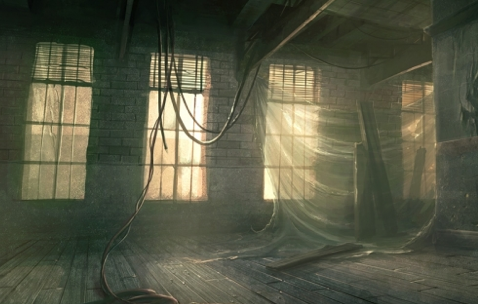
[3] A woman’s (or man’s) jealousy of her (or his) best friend takes over their life . Could link to ‘Othello’ or ‘Medusa’. Think about why. Start this when the woman is with her friend in a frenzy of jealousy…

[4] A model who has always been obsessed with her looks has acid splashed in her face and is disfigured. Could link to ‘Les Grands Seigneurs’, or ‘Mirror’ by Sylvia Plath. Start this with her looking in the mirror then opening her front door… By the way, this story is true. The woman in the picture is called Katie Piper .

[5] Fear of heights : nine year old with family who are in visiting a famous tall tower for the first time. The rest of her family want to go up the tower, but if the child won’t go up, someone will have to stay behind with them. Start this at the foot of the tower…
Want more ideas? Get a complete set plus a teaching scheme with model essays and all resources on my TES Resources shop here .

[6] Small child really wants cake but has been forbidden from taking it down from the shelf. Start this story with the child lusting after the cake, which you should describe – baking, decorating etc – in delicious detail. [ read a short, very funny version of this here ]

[7] A man is obsessed with a woman who does not love him back (or the other way round) . Could link to ‘Havisham’ by Carol Ann Duffy, ‘Give’ or ‘Alaska’ by Simon Armitage or ‘The River God’ by Stevie Smith . Start this when he realises she doesn’t love him back or when he decides to do something about it – get a haircut, stop eating raw onions, go to the gym, pretend that he also loves ‘horoscopes’ and ‘shopping’…

[8] Dangerous Ambition (links to Macbeth). Want the lead role in the school play (or to be head girl/boy)? What will you do to get it? Start this when you realise the lead is up for grabs but you’re not the first choice.

Racing Car driver (motorcross, road or drag racer) is up against his old teammate, now his main rival. Driver needs to win this one or it’s the end of his career. He sees that one of the mechanics on his rival’s car has fixed something up wrong. What does he do?

[9] Jealous woman (or man) chases husband (wife) to find out where they’re going. Could link to ‘Medusa’, ‘Havisham’, or ‘Othello’. Start this story when they decide to chase / follow. Use flashback, or recollection to explain why.
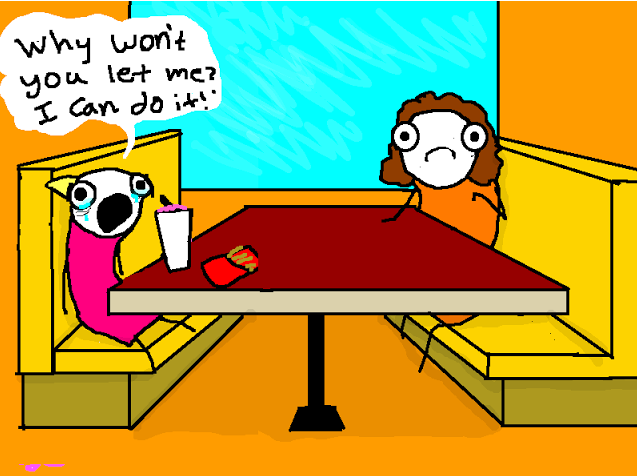
[10] Small child really wants to go to another child’s birthday party but there’s a problem. He has to go to his dad’s that weekend/hasn’t been invited/has to go to the dentist instead. How does he deal with or solve it? Start this story at the moment where the child realises he can’t go. [ read a short, hilarious one here ] III Lost

[11] An old man, who has never cooked or cleaned for himself, has just got home after his wife died (of old age, in hospital). You could link this to ‘Old Age Gets Up’ by Ted Hughes. Now he has to try to do housework – cook, etc. Could be comic / tragic.
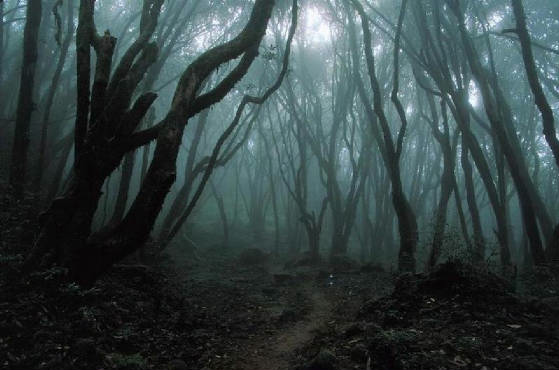
[12] You go for a forest walk (e.g. on a Geography trip or DofE) with someone you don’t like much from school and get lost. Could link to Robert Frost’s poem ‘The Road Not Taken’, ‘Storm in the Black Forest’ by D.H. Lawrence or ‘Wind’ by Ted Hughes. Start this story just before the main character begins to suspect they are lost. Start funny, ends up scary as it starts to go dark. Get describing words for a forest story here .

[13] Parent-Child: In a busy town centre, a mother loses her child who has previously been annoying her . Link this to ‘Mother A Distance Greater…’ by Simon Armitage, ‘Catrin’ by Gillian Clarke or ‘My Father Thought it Bloody Queer’. Start this with the child’s tantrum, mother’s thoughts then quickly move to realising the child is gone.

[14] World famous BMXer (or other sports person, footballer, skateboarder, surfer) is in a car crash – or other accident – and loses his leg. Will he ever ride again? This can link to ‘Out, Out-‘ by Robert Frost. For more on the guy in the photo see this video . Start this story when he wakes up in a hospital bed.

[15] A bsent father returns trying to spend time with his kids. How do they react to seeing him after so long? [this idea is done beautifully in the story, ‘Compass and Torch’ in the AQA anthology Sunlight on the Grass]. You could also link this to ‘Follower’ by Seamus Heaney. Start this when the re’s a knock at the front door.
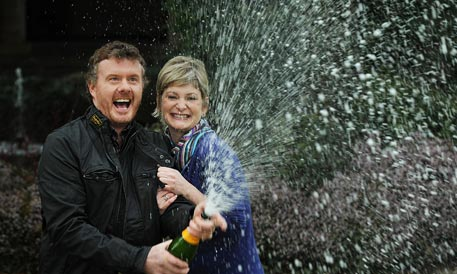
[16] You win a million pounds on the lottery. Everyone you know wants some. What would you buy? Friendships are ruined. Then you are robbed… Start this when you check your bank balance and there are sooooo many noughts at the end it looks like a bank malfunction. IV Coming of Age
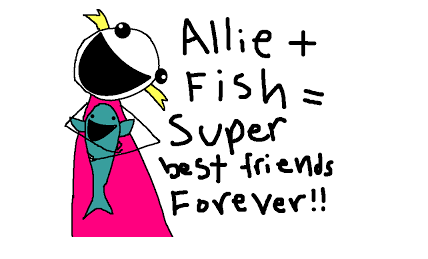
[17] Death of a pet. Ferociously funny, very short story about a girl and a fish [ here ]. Start this when you find the pet… dead, or just before. You can use flashback – when you first got the pet, etc.

[18] Learning a secret you wish you’d never found out – e.g. finding texts on your dad’s mobile from his girlfriend while your parents are still married – or learning that your mum is planning to secretly leave your dad. Start this when you’re just idly messing with the parent’s phone or laptop.
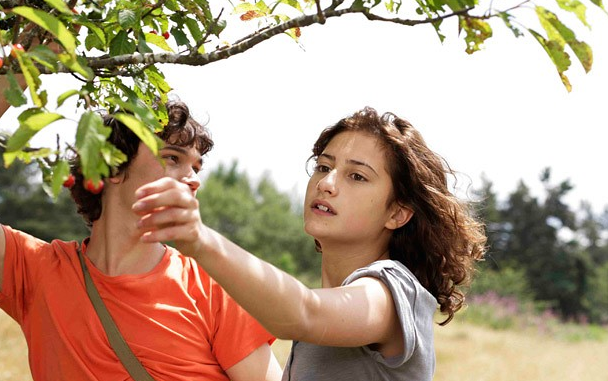
[19] falling in love for the first time , as in Romeo and Juliet. Start this when they see each other or their first proper meeting. Link this to ‘Sonnet 18 Shall I Compare Thee’, ‘Sonnet 116 Let Me Not’, ‘Quickdraw’ or ‘Hour’, by Carol Ann Duffy or ‘To His Coy Mistress’ by Andrew Marvell.

[20] The first time you have to do a really disgusting piece of housework / cook a meal for yourself and how you tackle it. Start this when you realise that no one else is going to do this foul job except you. Read a description of cooking a meal here .
V The Chase / Monsters

[21] You’re camping with your friend in the woods. Then you hear a noise outside (wolves, person, etc). Start this as you’re getting settled to go to sleep – then you hear snuffling (or whatever). Read Bill Bryson’s hilarious account of this exact event, and also an account of surviving a bear attack from the OCR exam paper here.

[22] You have something someone else wants – gold, diamonds etc. They chase you to get it. You choose the landscape: city, ruined derelict warehouses, Brazil, forest, cliffs etc. Start this at the moment you realise someone is following you. You can link this to the final chapter of Lord of the Flies .

[23] You are the last surviving human after the zombie/vampire apocalypse. Now they have found you. This is the plot of ‘I Am Legend’. You can link this to Edwin Muir’s post-apocalyptic poem ‘Horses’, ‘Wind’ by Ted Hughes or the final chapter of Lord of the Flies . Start this at the moment you (or the main character) realises someone is coming towards your hiding place.
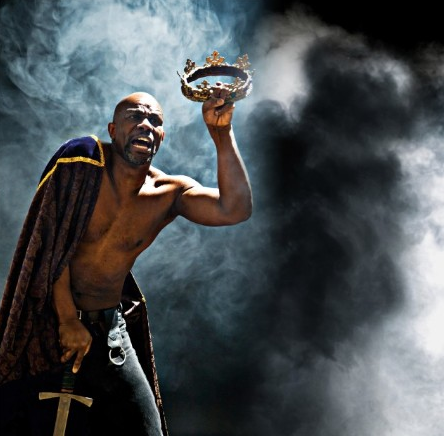
[24] The King is a tyrant who has killed your family. Now you will take revenge . Start this story as you are just about to go through the city walls.
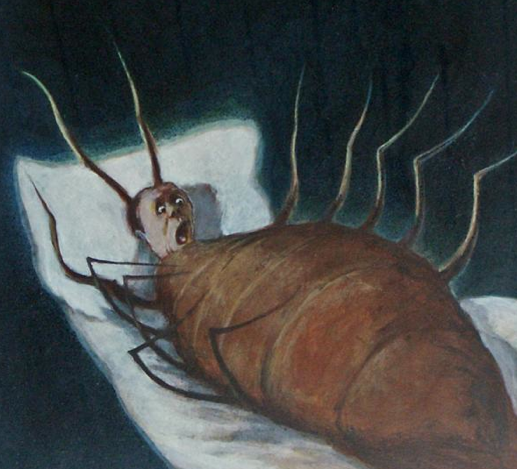
[25] You wake up and discover you have been turned into a giant insect. How does your family react? This is the plot of Kafka’s Metamorphosis. Read this here . Start at the point you wake up, and gradually realise what has happened.
Submit a Comment Cancel reply
Your email address will not be published. Required fields are marked *
Save my name, email, and website in this browser for the next time I comment.
Recent Posts
- Example English Literature Essays For Oxbridge Applications and Coursework
- What is Pathetic Fallacy? Simple Explanation for GCSE, IGCSE, and Common Entrance
- Writing to Describe Photographs of Interesting Places
- Storm on the Island Heaney: Context, Interpretation and Annotation Analysis
- The Prelude, Wordsworth: Context, Analysis, Annotation and Likely Exam Questions GCSE Poetry Exam
Recent Comments
- Student Hacks
- Studying & Revision
- Work & Jobs
10+ GCSE creative writing ideas, prompts and plot lines

Getting a good GCSE creative writing plot going can be difficult, here are some ideas to help you out.
Ahead of your exams, here are a selection of GCSE creative writing ideas and prompts to hopefully provide some inspiration.

The Lost Timepiece
Prompt: In an old, dusty attic, a teenager discovers a mysterious pocket watch that doesn’t seem to tell the correct time.
Potential Story Directions:
- The watch could transport the teenager to different moments in history whenever it's wound.
- The watch might belong to a long-lost relative, leading to a family mystery.
- The watch could be counting down to a significant event, and the protagonist must figure out what is about to happen.
The Secret Garden Door
Prompt: Behind the overgrown ivy in the school's garden, a student finds a door that wasn't there before.
- The door could lead to a magical world, offering an escape from everyday life but with challenges of its own.
- It might be a portal to the past, showing the school's history and secrets.
- The door could be a metaphorical passage to self-discovery, revealing hidden aspects of the character’s personality.
The Last Message
Prompt: A character receives a mysterious message in a bottle on the beach, written in a cryptic language.
- Deciphering the message could lead to an adventure, perhaps a treasure hunt or a rescue mission.
- The message might be from a distant land or time, offering insights into an ancient or futuristic world.
- It could be a personal message from someone significant in the character’s past, triggering a journey of emotional growth.
Midnight at the Museum
Prompt: A night guard at a museum notices that the exhibits come to life after midnight.
- The guard could interact with historical figures, learning about history firsthand.
- There might be a plot to steal an exhibit, and the living exhibits help to thwart it.
- The phenomenon could be linked to a supernatural event or an ancient curse that needs resolving.
The Forgotten Melody
Prompt: A pianist discovers an old, unplayed piano in a neglected music room that plays a melody no one seems to recognize.
- The melody could be a key to unlocking forgotten memories or a hidden past.
- It might be a magical melody, having various effects on listeners.
Each of these prompts offers a starting point for creative exploration, allowing students to develop their storytelling skills in imaginative and engaging ways.
Galactic Storm
Prompt: Astronauts on a mission to a distant planet encounter a bizarre, otherworldly storm.
- The storm could have strange, mind-altering effects on the crew.
- It might be a living entity, communicating in an unprecedented way.
- The crew must navigate through the storm to discover a hidden aspect of the universe.
Unearthed Powers
Prompt: A teenager suddenly discovers they have a supernatural ability.
- The power could be a family secret, leading to a journey of self-discovery.
- It might cause conflict with friends and society, forcing the protagonist to make difficult choices.
- The ability could attract unwanted attention, leading to a thrilling adventure.
Reflections of Reality
Prompt: A story that mirrors a significant real-life experience involving friendship or a pet.
- The story could explore the depth of human-animal bonds or the complexities of friendship.
- It might involve a heartwarming journey or a challenging ordeal.
- The protagonist learns valuable life lessons through these relationships.
Chronicle of Times
Prompt: A character discovers a way to travel through time.
- Traveling to the future, they encounter a radically different world.
- In the past, they might inadvertently alter history.
- The story could explore the moral and emotional implications of time travel.
Apocalyptic Event
Prompt: A natural disaster of unprecedented scale threatens humanity.
- The story could focus on survival, resilience, and human spirit.
- It might involve a journey to avert the disaster.
- The narrative could explore the societal changes that occur in the face of such a disaster.
The Unsolved Case
Prompt: A detective starts investigating a complex and mysterious murder.
- The investigation uncovers deep secrets and conspiracies.
- The detective's personal life might intertwine with the case.
- The story could have a surprising twist, challenging the reader's expectations.
Retold Fable
Prompt: Modernize a classic fable or story, such as the Boy Who Cried Wolf, in a contemporary setting.
- The story could be set in a modern city, exploring current social issues.
- It might be told from a different perspective, offering a fresh take on the moral of the story.
- The narrative could blend the original fable with current events, creating a powerful commentary.
Forbidden Love
Prompt: Two characters from vastly different worlds fall in love, against all odds.
- Their love could challenge societal norms and expectations.
- The story might explore the sacrifices they make for each other.
- It could be a journey of self-discovery and acceptance in the face of adversity.
Thomas Brella is the founder of Student Hacks, starting the website in 2013 while studying at the University of Brighton to share tips and tricks on life as a cash-strapped student. He's now spent over 10 years scoping out the best ways to live on a budget
Follow on Twitter
Like on facebook.
Paper 1: Creative Writing
In the exam you're normally given two options: a descriptive piece or a narrative piece. neither is worth more or less than the other so it's up to you to choose which suits you best. though describing the same thing for 45 minutes can see a little tough, i'd argue that the description is actually easier than the narrative. the problem with writing a short narrative, is its shortness., to do this well you need to make sure that your plot is very, very , very , very simple . you'll only have 45 minutes to write it, and that doesn't leave a lot of space for character development or events., really, you should be able to tell your storyline in one sentence, any more than that and it's probably too complex for the exam., i've included some of my own below to give you an idea of how much plot i've managed to include....
The Simple Scene
Perspectives
An Unreliable Narrator
Using Description
Read over the stories above and pick one structure that you think you could use. then, google some images and see if you can find a way for your chosen structure to become a story connected to that image. the key with a structure is that you can practice with it, but it will still fit any end you choose., but also, there are literally millions of short stories on the web, simply because writing is such a pleasure and sharing stories is so fundamentally human. to help you filter through some of them, you'll find a list of some of my favourite places below:, https://themolotovcocktail.com/, https://wigleaf.com/, https://blog.reedsy.com/short-stories/, https://www.flashfictiononline.com/.

Miss Huttlestone's GCSE English
Because a whole class of wonderful minds are better than just one!
2 Grade 9 Creative Writing Examples
I recently asked my year 11s to pen a piece of description and/or narrative writing for their mini assessment. I gave them the following prompts:
Your school wants you to contribute to a collection of creative writing.
EITHER: Write a short story as suggested by this picture:
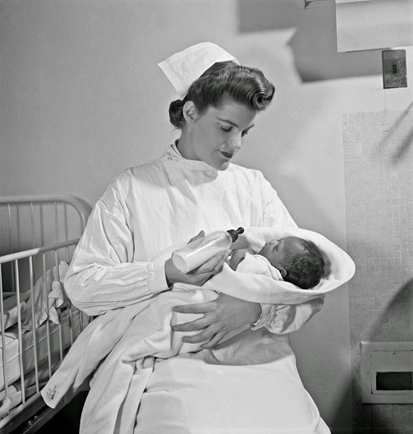
OR: Write a description about a person who has made a strong impression on you.
The following were two COMPELLING and CONVINCING examples of the second choice – one pupil taking ‘you’ as a fictional invitation, the other as a biographical one:
EXAMPLE ONE:
Gradually, I awake and open my eyes only to see the cracked white ceiling which greets me every day. Here I sit, slumped in the bed with the scratchy white sheets hugging me and muffled beeping noises jumping into my ears. Rubbing the sleep crust from my bloodshot eyes, I observe the scene before me. The sound of footsteps overlapping as nurses rush from bed to bed; the metallic tang from stainless steel invading my nostrils; the cold metal bed rail imprisoning and mocking me; the pungent scent of antiseptic troubling me and the blood-curdling cries and moans utterly terrifying me. Using all my strength, I try to imagine I am somewhere else, anywhere else but here.
Crowds, signs, roars: it was 1903 and the suffragette movement had begun. It was a crisp night, refreshing almost and I had taken to the streets. It was like I was possessed by something that night, some urge and deep desire within me that had led me there, surrounded by women like myself. I stood clueless and lost in the crowd; the women yelling ‘Deeds not words’ in unison; passionately parading with large wooden signs and viciously shattering windows with bricks and stones. Despite the violence that was displayed before me, I was not afraid of what was happening and I didn’t deem it unnecessary or improper, in fact I wanted the same as these women, I wanted equality. Abruptly, all of the roars and cheers became muted and faint, one woman walked slowly towards me, her hair messily swooped into an updo, her clothes somewhat dirtied and her chocolate brown corset slightly loosened. There was a glimmer in her eyes as tears seemed to swell within their hazel pools, she seemed inspired, hopeful. After reaching me in the crowd, she held out her hand, gently passing me a sign. Immediately, I clasped it and the yelling and chanting rang loudly in my ears once more. My journey had begun.
Here however, is where it ends. I am aware I do not have much time left, as the doctors have told me so, and spending my last moments in this hospital room is not optimal. However, as I look around I can see beauty within a room which at first glance seems void of it. The hollow medical tubes by my side remind me of the awful act of force feeding I have faced in the past; the shrieks and bawls of patients reflecting the pain women had felt in my time and the bed bars mirroring the prisons we were thrown into and the gates we would chain ourselves too. I know these things may seem far from beautiful, but I can see my past within this room, the power I possessed and the changes I have contributed to today. I know now that I can leave this earth having had an impact. Slowly I close my eyes, I can see her, the women who changed my life many years ago, her name, Emmeline Pankhurst.
EXAMPLE TWO:
I will never forget that day. The hazel pools of her eyes glazed over, and hands delicately placed at her sides. Nobody in the room could quite grasp the fact that this was happening. The crowds of black attire row on row seemed to mimic the thing she loves most in life, the piano. However, this time she had taken the ivory natural keys with her and left everyone else with the sharp tones. You needed both to create beautiful symphonies but all that filled the room was the excruciating silence of her absense. Even the metronone like ticks of the clock seemed to come to a standstill.
It had all began that day, she seemed to open up this whole new world for us to explore together as she placed my fingers onto the keys for the first time. I knew that this was what I was meant to do. She was the most passionately beautiful pianist I had ever seen in my life. Often, I would peer round the oak doorway before my lessons just to catch a glimpse at her. It seemed like nothing in the world mattered to her at the time.
As the years progressed, so did the scope of this world we were exploring. Each sheet of lovingly handwritten sheet music was like a new section of the map we were slowly creating together. Each of her students had their own map. Each as beautiful and each as unique as the pianist. The crotchets and quavers that adorned the staves directed the different paths we could take as my fingers graced the keys. This may not have been a beautiful ballet routine, but this was our dance and it had been carefully choreographed just for us.
That piano room was the safest place in the world. Every inch of it her: the potent scent of her floral perfume; shelves full of scruffy and well loved sheet music; rows upon rows of framed photos of her and her students; the vintage piano which she always kept in tune, it was home. I couldn’t bear the
idea that someone else was going move in and rip away the music room without a second thought. It was her music room.
It was up to me now. Up to me to finish this journey we had begun together.
She may not be with me in person anymore, but she will always live within the world we built together and nothing could ever change that. For she could never truly be gone since she left a piece of her within every one of her students; the passion for piano.

Share this:
Published by.
gcseenglishwithmisshuttlestone
Secondary English teacher in Herts. View all posts by gcseenglishwithmisshuttlestone
2 thoughts on “2 Grade 9 Creative Writing Examples”
This has helped me a lot, I myself am preparing for a narrative test like this and these prompts and descriptive short stories are marvellous! Thank you for sharing this! 🙂
My pleasure!
Leave a comment Cancel reply

- Already have a WordPress.com account? Log in now.
- Subscribe Subscribed
- Copy shortlink
- Report this content
- View post in Reader
- Manage subscriptions
- Collapse this bar

GCSE Creative Writing: How to Sculpt My Narrative Vision?
Creative writing traditionally stands in opposition to technical writing, so named because it is used to differentiate imaginative and particularly original types of writing from more rigid types. However, creative writing is just as technical, and difficult, as these other types. The assumption is often made that creative writing is a talent – “can I really learn how to write creatively?” – but the true keys to creative writing, whether writing for your own enjoyment, preparing for a school or GCSE exam, are imagination, content, and organisation . This guide will teach you how to improve creative writing and how to excel in your GCSE creative writing answers.

The Key Elements of GCSE Creative Writing
Imagination – the GCSE creative writing prompts are usually very open-ended and broad, remind yourself that broad questions are not restrictive, and allow your mind to explore all caveats of the question, and take the reader on a truly original journey
Content – to showcase your ideas when answering your GCSE creative writing task you need to be able to show your skill with tone, style, and vocabulary; we will touch on just how to do this later!
Organisation – planning the structure of your answer is key. Even though creative writing can be seen as ‘looser’, remember that a good structure is a good way to ensure you are staying in control of your GCSE creative writing task. We will touch on how to plan effectively later too!
Three Key Ways to Improve Your GCSE Creative Writing
1) focussing on the ‘how’ and developing it.
It can be very daunting when you are presented with a vague prompt to think about how you might achieve all of these things, now we know what they mean let’s look at how we might break them down with an example.
Take the example GCSE creative writing task: ‘ Think about a time you were afraid ’.
1) Imagination – where are you going with this? The prompt allows a lot of scope for you as a writer to take this piece wherever you want. You want to plan a piece you are excited by, that you are confident writing, and that is a little bit ‘outside the box’.
We can anticipate many students’ answers describing a spooky forest or a secluded house at night-time; if you are pushing for the higher boundaries in your GCSE creative writing, you want to write something that will make the examiner notice you.
Think about the last time you were afraid – how likely is it that you found yourself in a horror-film-esque eerie setting? Perhaps you want to describe the time you auditioned for the school talent show, or your first trip into the dentist alone. You don’t have to be totally avant-garde but remember a skilled writer can create a sense of unease using literary technique alone – don’t rely on a traditional ‘spooky setting’.
2) Content – how are you going to take us there? You want to ensure your communication is convincing and compelling. This means your need to maintain style and tone throughout.
Make a decision about the characteristics of who is narrating your story early on and stick with it (it will often be directed at you, but the examiner doesn’t know you as a person – be creative! If it suits your story to make yourself smarter, more anxious, quieter etc, then do it). Let’s look back to our prompt above. Perhaps you make the decision that you’re writing the piece as you, and you’re incredibly forgetful. This might mean you ask short questions throughout the piece, raising the tension. Maybe you feign confidence and so while the speech of the piece seems assured and at ease, the internal monologue is vastly different, throwing a sense of unease to the narrative early on.
Be ambitious with your vocabulary! Vocabulary is a great way to help set the tone of a piece. Likewise, explore a wide use of linguistic devices (metaphor, simile, imagery, personification, repetition, symbolism – we will come back to these later!)
3) Organisation – how can you plan effectively? When writing a creative piece, first and foremost, you want to ensure you have a varied use of structural features within your paragraphs.
As a rule of thumb, each new paragraph should aim to develop the story and either bring a new idea into the story or develop a previous one. Within each paragraph, aim to show the examiner that you are capable of developing your idea (i.e. continuing the narrative and plot), but also that you are able to detail this from a different perspective.
An effective way to do this is with a structural feature: pick an interesting way to start a new paragraph, focus on contrast, play around with repetition (if you can, play around with the pace of the writing too – see below!), withhold information, use dialogue, experiment with different sentence structures and paragraph lengths, etc.
U2 Tuition Quick Tip : Have a look at your exam board website to look for sample answers. As you read these creative writing examples GCSE, think about what decisions the writer has made. How is it structured? What kind of language have they used? How have they responded creatively to the question?

2) Using ‘linguistic devices’ to set the scene in your GCSE Creative Writing
Metaphor and simile – metaphors and similes are both ways to introduce comparisons into your work, which is a good way to bring some variety when describing something instead of just listing off more adjectives. Similes are used specifically with the words ‘like’ or ‘as’ (“life is like a box of chocolates”); metaphors are a direct statement of comparison (“life is a rollercoaster”).
o How can you use these originally? When using these in your GCSE creative writing task, you want to showcase not just your ability to use them, but also your imagination and vocabulary. With both of these, think of appropriate comparisons which develop the tone of your piece. For example, if you are writing a piece about happiness – ‘his smile was like that of a child at Christmas time’ (simile), or, if you are writing a piece about loneliness – ‘loneliness was a poison’ (metaphor). See how both comparisons match the tone – when writing a happy piece, we use specific things about happiness (e.g. Christmas), when writing a sadder piece, we use sadder objects for comparison (e.g. poison). This will help develop tone and showcase originality.
Imagery – this is used to develop key motifs within the mind of the reader; again, this is a tool for comparison whereby we are comparing something real with something imagined or ultimately non-literal.
o A good way to think of imagery is to appeal to the reader’s senses: how can you create a sensory world for them? Take the brief above once more. We could say “I was afraid when I left the house”, or, we could appeal to sensory imagery: “I pulled my auburn hair into my mouth to chew it as I closed the door to the house. Thud. The air was cold on my cheeks, and my pink nose stood out against the grey sky and grey pavement.” Here, we paint a far richer picture, even though we don’t necessarily develop the story.
Personification - when a personal nature is given to a non-human object. This can be useful when you are faced with long descriptive paragraphs as it serves as another way to break up boring adjective listing, keeping your GCSE creative writing varied and interesting.
o Be imaginative and try and include this once in every piece if you can. Remember to tie it in with developing the tone of the piece! I.e. if you are writing a happy piece: “the sun smiled down on me, and I beamed back with gratitude” – this sentence creates an immediately positive atmosphere. However, the sentence: “the wind whispered quietly through the long grass” creates a sense of uncertainty. NB: notice how the weather is an easy and subtle way to help develop a ‘feeling’ throughout your writing.
Repetition – a word or phrase is repeated in order to achieve a certain desired effect. We can use different types of repetition to remain original and keep our writing sophisticated:
o Try repeating only the last few words of a line – “If you don’t doubt yourself, and you can keep a clear head, then you can do it. You can do it.”
o Try repeating the same phrase at the end of following sentences – “On the fields there was blood, in the sea there was blood, on the sand banks there was blood, on the ships there was blood…”
o Try repeating the same words in a new sense to reveal information in a new light – “I don’t dance because I am happy, I am happy because I dance”
U2 Tuition Quick Tip : Reading lots is the best way to improve your GCSE creative writing skills. Keep reading at an advanced level, learning new vocabulary and thinking about the way the author has decided to write their text. If you feel sad reading it, how has the author made you feel that way? If you are immersed in the setting, what language has the author used to make you feel like you’re there? Sevenoaks school have a great reading list for Year 10 and 11 that will give you lots of inspiration for your GCSE creative writing task.

3) Using ‘structural features’ to hook the reader of your GCSE Creative Writing Task
Openings – you want to make sure the start of your text entices the reader, so you may want to start with a very developed complex sentence, with heaps of sensory imagery that immediately immerses the reader in the world of the piece; alternatively, or you may wish to grab their attention in a more direct way – “Bang! Oh god, how was I going to get out of this?”
Contrast – highlighting the difference between two things is a compelling way to describe and develop ideas; we have talked in depth about ways to do this above (simile, metaphor, imagery, sometimes repetition for effect)
Pace – experimenting with the pace of the piece is a very sophisticated way to create a mood in your GCSE creative writing. For example, if it is a summer’s day and time does not seem to pass, find a way to highlight this using some of the techniques outlined above – “the sun sat high in the sky, unwavering, for what seemed like forever”, “the sounds of the crickets chirping and the birds merriment overpowered the sound of my watch – we felt truly timeless”. Equally, if you want to build tension, find a way to increase the pace; generally, this can be done by piecing together short, simple sentences: “I knew I had to move fast. Round the door. Up the stairs. Wait. Breathe. Move. Up the next flight. Clear. Move.” Etc, this helps immerse the reader in the mental world of the narrator and as a result they engage far more with the piece.
Dialogue – inserting dialogue into a piece can be a convincing way to introduce new information to a text, think of ways to be inventive with this: does our narrator talk to themselves? What information are we told about additional characters that are introduced? What new approaches have we learned to aid with describing these new characters – and remember – always choose these in line with developing a tone for the piece.
Withholding information – this can be a useful way to build a sense of uncertainty and unease into a piece. Perhaps the narrator is withholding information from other characters, perhaps the narrator is withholding information from the readers themselves! “I knew it had to be done. I didn’t have time to consider the what-if’s and the maybes of it. It had to be done. And it had to be done now.” How much more unsettling is that sentence when we don’t discover what the ‘it’ is – if we want to create humour for a light-hearted piece, perhaps it is getting a tooth removed; if the piece is darker, perhaps the ‘it’ is something far more sinister…
Sentence length – Play around with a variation of simple and complex sentences. Complex sentences can be difficult to construct at first. Remember a few key rules: they are either used effectively to develop one key motif: ‘the snow was white and fell down like tiny elegant dancers in the wind, until at just a moment’s notice, it would land and join a far larger flurry of white across a thousand snow-drenched fields’. Additionally, complex sentences can be used to introduce a lot of new information in one succinct way: ‘It was autumn when he last came, not that I had been counting, but when he last came my hair came only to my shoulders, and I was not yet tall enough to reach the apples on the tree – gosh, what would he think of me now’. The difference between the two is clear, one develops a singular motif and one introduces new ideas quickly – both are effective, and you should aim to be able to write both types well.
While GCSE creative writing can seem daunting at first, using the three keys to success (imagination, content and organisation) alongside these advanced linguistic devices and structural features is a great way to develop and succeed in your GCSE creative writing exam. Start to enjoy taking the reader on a journey, learn to navigate the realms of description, experiment with tone and you will be well on your way to success!
“Write it like it matters, and it will.” – Libba Bray
By U2 mentor, Hazel (Philosophy & Theology, University of Oxford and a published poet!)
Looking for a GCSE Creative Writing tutor to improve written skills?
If you are interested in support with GCSE creative writing for your GCSE English Language or Literature papers, or general Creative Writing endeavours, why not check out our offerings on the GCSE page and book a free consultation to discuss how we can boost your chance of success. We have a large team of predominantly Oxbridge-educated English mentors who are well-placed to develop students’ written skills, teaching how to structure writing, and the literary and rhetorical techniques that this requires. Get in touch now so we can match you with an English writing tutor online or face-to-face.
The ELAT: Our Guide to the Oxbridge English Admission Test in 2024
How to write a formal letter (11+ to gcse).
Osterley Education Quality Tuition for all ages

Creative Writing Tips
Here are our top tips for acing any creative writing exam!

1. HAVE A BANK OF STORY PLOT LINES READY
One of our top tips for any creative writing exam, is to have a bank of easily adapted plot ideas up your sleeve. Time is precious in an exam and you need to spend minimal time thinking, leaving you with the maximum amount of time to crack on with your writing!

2. DON'T MAKE YOUR PLOT LINES COMPLICATED
Don’t make your plot too complicated- only one thing needs to happen- just DESCRIBE ONE TEN MINUTE MOMENT. If your story was turned into a film, it would be a 10 minute scene, not a 2 hour film! Keep it simple!

3. DESCRIBE DON'T EXPLAIN
This point carries on from point 2. When you have a complicated plot then you end up explaining and summarising. What any teacher or examiner wants to see in a story is description. One moment described very slowly, in lots of detail.
4. DON'T BE AFRAID TO 'MAGPIE' IDEAS
'Magpieing' is a phrase that teachers use to describe using other people's ideas for story writing. Authors do it all the time! Nothing needs to be original! If you hear a great phrase in a book that you are reading, use it in a story!
5. SHOW DON'T TELL
'Show don't tell' is phrase that teachers use all the time, when teaching creative writing. It means, don't TELL me that the character is nervous; SHOW me that they are nervous by describing their sweaty palms and butterflies flutterin g in their tummy.
6. PAINT A PICTURE IN THE READER'S MIND
If you write a simple sentence such as, 'The man walked down the road', you will conjure up different images in different reader's minds! Is it a tall man or a short man? Is he walking angrily or happily? Add description to paint the same picture in the reader's mind, as you have in your own!
7. USE POWERFUL VERBS
The difference between an ok story and a great story, usually comes down to verb choices. Every sentence must contain a verb, so why not use powerful verb choices! For example, 'said' is a boring verb. Swap it for a verb such as 'mumbled' or 'screeched' to add more description!
8. PERSONIFICATION
Personification is a writing technique, where an object is described like a person. The effect is that it tells you the mood of the story- how the characters are feeling. In a happy story, the sun might be smiling but if the mood of the story is angry, the sun might be scowling!
9. SIMILES AND METAPHORS
Similes and metaphors are both types of comparisons. We use these comparisons to exaggerate a quality. Similes use the word LIKE or AS- ' He ran as fast as a racing car' or 'He zoomed like a racing car'. A metaphor does not contain like or as- 'He was a racing car zooming.'
10. ALLITERATION
Alliteration is when words near or next to each other start with the same sound. An alliterative phrase like, 'flickering, firey flames' is effective because the repetition of the F sound emphasises the sound of the fire. This is a great way to add marks in an exam!

11. ONOMATOPOEIA
We always want to describe using our senses, and onomatopoeic words describe sounds. Using sounds as verbs in a sentence, for example, BANGING, CRASHED, RUSTLING, SCREECHED, is a great way to add extra marks in a creative writing exam.
12. AVOID REPETITION
Avoid repetition! Make sure that you vary the first word in every sentence- sometimes start with a verb, sometimes start with a preposition, sometimes sart with an adverb... Do NOT always start with He/ She/ The! Also, vary your sentence length- some short, some medium, some long.
13. GREAT WAYS TO START A STORY
Think carefully about the first sentence in your story, and more importantly the first WORD! Do not start with ‘Once upon a time’ or ‘One day’. Starting with a subordinating conjunction like ‘As’ or ‘While’, is a great way to open a story as you are instantly giving the reader additional information to paint a picture of the scene in their minds.
14. PREPOSITIONS
Use prepositions in your sto ry- particularly at the start of sentences. Prepositions are words that tell us WHEN or WHERE. Prepositions that show where, are particularly good when describing a setting. It allows you to be precise and to paint a picture in the reader's mind.
15. AVOID DIRECT SPEECH
Do not overuse direct speech- it tends to explain rather than describe. Direct speech can be a great way to start a story and it is effective in establishing relationships between the characters- but use it no more than twice. You will get a mark for correct punctuation but don’t waste dozens of lines on one mark!
16. USE THE ACRONYM MAPSO
Use the acronym MAPSO as a checklist to ensure that you have used a variety of techniques in your story. There are lots of acronyms out there, but I like MAPSO the best- it’s short, easy to remember and covers the 5 most important techniques- Metaphor, Alliteration, Personification, Simile, Onomatopoeia.
17. DESCRIBE ACTIONS NOT FEELINGS
Avoid using these phrases in a story- they FELT, they THOUGHT, they WONDERED, they REALISED, they DECIDED… all of these phrases TELL the reader and what we want to do is SHOW. The reader is able to work out for themselves what the character is thinking and feeling from the description of their ACTIONS.
18. WHO/ WHERE/ WHEN/ WHAT/ WHY/ HOW
By the end of the first paragraph, make sure that the reader has an idea of WHO your character is, WHERE they are, WHEN it is (time of day/ season), WHAT they are doing when the story begins, HOW they are doing it (the mood) and WHY (it does not matter what order you put this information in).
19. PLANNING
The key thing is to keep your plan short- spend no more than 2 minutes- it doesn’t matter if your plan is messy and you shouldn’t write in full sentences. A five part plan is ideal (just a few words for each section) as 5 paragraphs is about the right length for a story written in a half hour exam.
20. CHECK SPELLING AND PUNCTUATION
Always leave yourself a few minutes at the end of the exam to check for silly mistakes!
This covers 11 plus descriptive, story and letter writing for all schools / levels
Creative writing, list of 11 plus creative writing topics, story titles, story template, story plan example - things to include, example of a good story, example of a bad story, example of a good letter, example of a good description, bad description, 11+ creative writing questions from real exams—non-fiction prompts, checklists for creative writing.

This article contains useful information that will help you to write good stories, description and letter in your 11 plus exam.
When it comes to developing creative writing topics and tasks, it's helpful to focus on core themes and emotions that often appear in stories. Here are some areas to consider when building your descriptions:
- Animals - You can use literary devices like personification, exaggeration, and similes to bring your descriptions of pets or favorite animals to life, or even animals that frighten you.
- Emotions and feelings - Many stories require descriptions of emotions like fear, joy, or the experience of being lost or alone. Titles like "My Brilliant Day" or "Lost!" and "Alone!" can provide a clear direction for your writing.
- Enjoyable activities - Describing the activities you love, from mountaineering to gardening, is an opportunity to convey both the activity itself and the emotions it elicits.
- The natural world - Whether it's hills, mountains, rivers, streams, or weather phenomena like lightning, rain, and sunshine, describing the natural world can add depth and richness to your writing.
- The built environment - From houses and office blocks to cottages, castles, roads, bridges, churches, and sheds, it's useful to develop a vocabulary for describing the built environment.
Some examples of story titles are given below:
- The Day Trip
- The Broken Window
- The Abandoned House
- The Voice in the Darkness
- Alone - Craft a story with the title "Alone," where you suddenly realize that you are on your own. Your story can be true or entirely made up. Ensure that it includes your thoughts and feelings, as well as what happened.
- Visiting Relatives - Write a story, whether true or made up, about a visit you make to some of your relatives.
- Cousin's Visit - Compose a letter to a cousin inviting them to stay with you. In the letter, try to interest them in some of the varied and unusual activities they can participate in.
- Magical Moment - Describe a situation you've experienced that might be considered a "Magical Moment." Show what your thoughts and feelings were during that experience.
- Animal Description - Provide a detailed description of an animal you know well. Be sure to include what it does, how it behaves, and what it looks like.
- I prefer Winter to Spring
- The door and what was behind it.
- Ash on an old man’s sleeve.
- The Prince of Darkness is a Gentleman.
- Write a story that begins with the phrase – I had been waiting for such a long time for this to happen.
- Write a description of someone you admire. (You may choose someone you actually know, or someone you have never met. Describe them and explain why you admire them).
It was a calm day as I ______
The sun was smiling in the ______________
I felt ______________ because ___________
After I ________, I _________
The ____ was like a _________ because _______
There was an atmosphere of __________
Suddenly, _____________
My heart was filled with _________
Unless I ________, I would surely _________
Thankfully, ________
I managed to _______ because _______
After ________, I ______
I learned that ___________
In future I would be more careful of ________
Happily, I went off to ________
onomatopoeia
sense language
personification
parentheses
exclamation mark
check SPAG - spelling, punctuation and grammar
Write a story where a character goes into a shop and finds something unexpected
Rosie strolled happily into the pristine store; today was her birthday and her heart was bursting with expectation. It was time to receive the gift her parents had promised her: a new phone. The atmosphere in the store was bustling as the Saturday shoppers streamed in out of the sunshine.
As Rosie was browsing she noticed an odd looking man lingering near the back of the store. She didn’t pay him much attention but this discovery was soon to have devastating consequences. Rosie was gleefully talking to one of the staff members when caught a movement out of the corner of her eye….
“Everyone get down!” screamed the man, his face red with fury. “I want everyone’s phones and valuables on the floor. If you refuse you will regret it!’ Everyone scattered through the shop, tripping in panic. The man was a stealthy lion prowling among his prey. Rosie’s heart was filled with fear and horror - she would have to relinquish the phone she had just paid for. The cruelty of the situation twisted her stomach like a razor ripping into her flesh. The man had begun to grab the valuables in a dirty looking backpack and was about to confidently exit the store…..
Suddenly there was an explosion of movement outside the shop on the busy street. Fortunately, a local police car had been patrolling outside and the officers had caught a glimpse of the man’s odd behaviour. They had sprung into action! Grabbing the man boisterously, they took him to the floor and confiscated the precise valuables. Rosie breathed a sigh of relief - her phone was saved.
Eventually, order was restored as the sun smiled overhead. Shocked onlookers relayed the story to one another. Everyone graciously thanked the police for their brave intervention. Rosie now knew to expect the unexpected after her unpleasant discovery….
Write a story about a childhood experience
The pensive sky was filled with rushing grey clouds, illuminated by the lights of the fun fair below. I stood wearily in the bitter cold, flanked by my shivering parents as we stood in the cramped queue.
Winter Wonderland was the highlight of the festive season; families and tourists flocked eagerly from all over London, sampling the seasonal delights and treats, marvelling at the whirling dervish of colours and excitement. This year, 1999, was bigger than ever – it seemed as if the fair was engulfing the whole of Hyde Park, growing onwards as if greedily consuming the whole city in celebration.
Finally, we crossed the threshold. The murmuring of the masses filled my ears like chanting. My nose was smothered with the sweet smells of candy floss and waffles. Drunken tourists stumbled blindly from bar to bar, eagerly gulping down glass after glass of beer and blood red mulled wine.
I tugged at my mother’s arm and pointed. Past the roller coasters and cafes the lake shone like an icy lance of steel, cutting cleanly through the park. Jubilant children rushed backwards and forwards, skimming over its surface like polished stones.
“Are you sure, dear?” enquired my mother. “The lake looks very cold. We wouldn’t want you to fall in or have an accident”. She frowned nervously but could see the resolute expression on my face; my mind was made up! Moments later I was in the queue, looking out over the vast tapestry of the lake, framed by trees and illuminated by the faint moon.
My breath fogged like steam around me as the lake attendant fixed my boots on. They sternly clamped my feet; all of a sudden my limbs became turgid lumps of rock, pulling me into the ground. My mother and father laughed at my fumbling.
“We’ll be watching dear. Try not to fall over!” said my father. He tried to smile but a hint of nervousness crept into his face. After all, I was being pushed out into the great unknown of the lake, with only my fellow skaters for company.
Once I was on the lake, my stiff limbs scampered with short, awkward steps. I briefly lost my balance, grasped at the empty air and then corrected myself. In a few moments I was gliding effortlessly through the darkness, faster and faster, the children around me brief shadows that flitted from side to side. As I flew through the night the chilled air stung my face but I couldn’t help grinning.
A noise distracted me. I was far from the shore now – the dark of the park and surrounding trees had swallowed me, the twinkling beacons of the fair were a distant memory. It sounded like a shout but it was muffled by the piercing wind. I could see the faint outline of two figures. Were they my mother and father? I couldn’t see in the gloom, but their faces wore an expression of panic, for the ice had begun to crack near the shore. Within a few moments all the skaters might be plunged hopelessly into the icy depths, with no hope of rescue. At this stage I knew nothing of the danger, and continued to loop and spin through the air.
It was only when I got closer to the shore that I heard another sound. This was definitely one of fear. A young blond child was crying, tears streaming down her red face. Her mother was hugging her and shouting violently at the members of staff. I now knew something was terribly wrong.
It was then that I heard the first sound, like a faint clicking or scratching. Then through the gloom, I could see a faint line growing beneath me, tracing its way between me and the shore. The ice was breaking! I had no time to think and so just reacted, making my way to the nearest section of shore, stumbling spasmodically. With relief I grasped the rough branches of the hedge and could see, through sweat drenched eyes, my parents rushing along the bank side.
“That was a lucky escape, son” gasped my father. A few more seconds and we might have lost you.
“You’re never going skating again!” screamed my mother.
We made our way solemnly back along the banks of the river, eyeing the contrite staff who were being questioned by security.
As the gloom darkened into thick night, I looked back on the pristine lake and marvelled on how lucky I was to escape with my life……….
The Accident
I woke up. I walked down the road to get some food. I was tired.
I was hungry so I went to a Mcdonald’s. The queue was very very very big.
I didn’t want to wait so I went to the toilet. Inside the toilet it smelled very very bad. When I flushed the toilet the water came out and I was sucked into the toilet. I was being sucked into the toilet! I was sad.
A couple of hours later, someone heard me crying from in the sewer and helped me out. I smelled bad.
In future, I learned not to be flushed down the toilet.
Ealing High School
Uxbridge Road
23rd June 2012
Dear Head teacher,
I am writing this letter because I believe that more equipment is needed for the school gym. I hope you will consider my point of view. The most important items we need are running machines and a trampoline.
The first reason I believe this is because exercise makes a big difference to the way that people feel. 80% of students have said that exercise makes them happier and gives them more energy. Surely you can see why more equipment is a good idea?
The second reason I believe this is because lots of young people are overweight these days. For example, 1 in 4 young people in the UK are obese. This is a clearly a disgrace - getting more exercise at school would be an ideal way of tackling this problem.
It is true that some people disagree with me. They say that the new equipment will cost a lot of money, and that the school could use this money to buy more computers or books. However, this is not correct. If the students aren’t feeling happy and healthy then it doesn’t matter what other resources they have. They won’t be motivated to use them – that’s why the gym equipment is more important!
In conclusion, gym equipment is a priority for the school. I know that many other students feel the same. I hope that you will consider this letter when you look at the spending budget for the school.
Yours sincerely,
(Student name)
Carefully choosing their places among the sea of sunbathers, the new arrivals to the beach lay down their towels on the glistening sand as a red-faced toddler chants, "I want ice cream, I want ice cream!" as he passes the multicoloured van with his already exasperated mother.
Lounging on their luxurious houseboats, the wealthy residents of the marina gaze out to sea, watching the gentle waves move against weathered rocky outcrops. On one of the larger houseboats, a family of five dine on a bronzed lobster talking happily to each other.
Scuttling along the sea-stained sand, crabs of all shapes and sizes frantically make their escape from determined rock poolers.
Wielding her flimsy pink net, a young girl of around five perches on a boulder, laughing joyously as she scatters shrimp and prawns alike. Staring happily at his collection of shells, a young boy laughs as the waves lap at his feet.
Ice cream in hand, his mother watches him lazily from under the cheap, colourful umbrella. As if on a mission, a younger boy of around three digs at the sand, sweating as the sun beats down on him.
On a cliff, high above the beach, stands an aged man, grimacing at the inferior beings below. Clad in a huge overcoat, heavy black boots and a scarf wrapped around his neck, the greying individual turns and begins his journey home. Carelessly floating on a pair of lilos, two teenagers talk ceaselessly - breaking out in laughter and falling off their bright pink lilos every so often. The scent of hotdogs makes them hungry as they drag their lilos to the shore, intent on coercing their parents into
opening their wallets. Rain begins to fall on the beach, awakening sunbathers and scattering beach goers. As people start to pack up and leave, the rain grows heavier, causing bikini-clad girls to scream and take cover under umbrellas and food stalls. Engines roar in to life, and the beach is completely empty.
A busy airport
Shops and cafes filled everywhere. People were very busy and noisy. I was hungry but didn’t know where to go. A woman was running around screaming, saying I want a burger! Outside a plane roared by, like a fish. The toilets were full of people. In a cafe some children were playing football and annoying everyone. Outside the plane crashed - boom! The woman came to talk to me saying she was lost, but she still needed a burger. The day was hot and sticky. Lots of flashing lights lit up the departure gate like a christmas tree. There was the smell of smelly chickens and burning burgers.
- Write a thank you letter for a present you didn’t want.
- Write a thank you letter for a holiday you didn’t enjoy.
- Describe a person who is important to you.
- Describe your pet or an animal you know well.
- Write a letter of complaint to the vet after an unfortunate incident in the waiting room.
- Write a set of instructions explaining how to make toast.
- You are about to interview someone for a job. Write a list of questions you would like to ask the applicant.
- Write a letter to complain about the uniform at your school.
- Write a leaflet to advertise your home town.
- Describe the room you are in.
Checklist for story writing
- SAMOSAP BBUPRE
- make sure you answer the question
Checklist for letter writing
- Letter heading
- complex sentences
- ESCAPE Paragraphs
- formal tone / language
Checklist for descriptive writing
Checklist for continuing the story
Did you like this article? Rate it!

I am passionate about travelling and currently live and work in Paris. I like to spend my time reading, gardening, running, learning languages and exploring new places.
50 Common English Phrasal Verbs
Aqa/wjec gcse poetry, gcse poem analysis: seamus heaney’s “follower”, daljit nagra, singh song (2007), gcse english poetry analysis: poppies – jane weir, gcse english poetry analysis: exposure by wilfred owen, gcse english poetry analysis: war photographer – carol ann duffy, gcse english revision: andrew waterhouse, climbing my grandfather, english literature, ‘mars water’ passage analysis, ‘hawk roosting’ by ted hughes, an effective reading of ‘macbeth’, macbeth’s soliloquy act 1 scene 2, gcse essays about lady macbeth as a powerful character, a gcse essay about mr hyde as a frightening character, ‘an inspector calls’ by j.b priestley, gcse-‘refugee blues’ by w.h auden, synonym cards, communication in waiting for godot, a view from the bridge, critical vocabulary useful for english literature essays, writing and understanding non-fiction texts, analysing non-fiction and media texts, poetry analysis guide, how a poem’s title can unlock its meaning, iambic pentameter: iambic what, themes in jb priestley – inspector calls, truth or lie riddle, a christmas carol characters, a christmas carol themes, a christmas carol language, a christmas carol plot, great expectations characters, great expectations language, great expectations themes, great expectations plot, the strange case of dr. jekyll and mr. hyde plot, the strange case of dr. jekyll and mr. hyde characters, the strange case of dr. jekyll and mr. hyde language, gcse english: jane eyre plot, gcse english: jane eyre characters, gcse english: jane eyre themes, gcse english: frankenstein plot, gcse english: jane eyre language, gcse english: mary shelley’s frankenstein themes, gcse english: mary shelley’s frankenstein language, mary shelley’s frankenstein characters, the tempest study and revision guide: language, the tempest study and revision guide: plot & summary, the tempest study and revision guide: themes, the tempest study and revision guide: characters, language and structure – non-fiction, responding to non-fiction texts, punctuation, speaking and listening, personal presence, purpose and audience: non fiction texts, writing fiction – aqa, writing non-fiction, using language effectively, organising information and ideas, how to compare texts, gcse english language revision: responding and interacting, individual researched presentation, gcse english revision: fiction text types, creative writing 11 plus – stories, descriptions and letters, improve your writing grades with: punctuation, discursive writing topics, past papers, answering q4 in paper 2 (eng lang gcse) – perspectives, past exam questions: the crucible (wjec), past exam questions: to kill a mocking bird (aqa), cancel reply.
Your comment
Current ye@r *
Leave this field empty

- TOP CATEGORIES
- AS and A Level
- University Degree
- International Baccalaureate
- Uncategorised
- 5 Star Essays
- Study Tools
- Study Guides
- Meet the Team
- English Literature
- Prose Fiction
- Miscellaneous
Short Story - Creative Writing
I peered into the light with difficulty. I was lying in a pool of blood, feeling the liquid seeping through my underwear. Opening my eyes was hard enough, but moving them, that was another story. But where was I? I panned across what looked to be a barren island, only to discover, dune after dune of sand. The ocean seemed to stare me in the face and looking at it gave me a headache. I noticed the waves breaking closer to the shore. In a hurry, I turned around and limped across the beach, in search of higher ground, with a trail of blood following me. I became drowsy as I stood upon the sandy island, only coming across the occasional palm tree. Dehydration had taken its toll, as I collapsed to the ground with my arms and legs aching. I discovered hints of blood trickling down my arms. The cuts were not deep, but the bleeding persisted.
After taking a moment to recuperate, I heard familiar voices behind me. There they were, taking cover under a leaf shelter. The taller man turned around, hearing the rattle I was making behind the bushes and without warning...I shot out, with my hands above my head. Oh my god! Could it be? It was Terrance! I ran up to him and hugged him as hard as I could, sending him to the ground, with an unexpected thud! After being taken to their make-shift hut, I was introduced to Terrance’s friend, Timothy.

He later explained to me that he and Timothy had scoured the island for any food or water. And in doing so, they had stumbled upon the abandoned helicopter. It was only around 100 yards from the hut and it seemed in pretty bad condition. It had taken a few hits to the body work and one of the wings was missing. Before nightfall, we all did our best to recover as many items from the chopper as possible. Darkness fell as we retreated to the hut.
This is a preview of the whole essay
That night I just could not sleep, repeatedly seeing a helicopter crashing in my dreams. It all started on a stormy night; flying over the ocean. The weather was terrible, and a lightning strike was inevitable. Suddenly the turbulence picked up, and the helicopter began shuddering. Bang! The tail was gone. The helicopter spun violently and we plummeted to the ground...I woke up in a cold sweat, only to discover Terrance and Timothy gazing dubiously at me.
Another day dawned. Terrance had prepared breakfast, making use of last night’s scavenging. Disbelief grew inside me as resources ran low. However, going for a walk didn’t seem to cure anything with my arms and legs perilously aching again. As I panned across the area, a trail of empty chip packets caught me eyes, ones that I had salvaged! There he was, hiding in the distance, Timothy! The little bastard was munching away; he didn’t even notice me, gorging himself with food. I walked back in disgust, and confronted Terrance, informing him of the issue.
The days went on, and we were only left with two bottles of milk and a single Jar of Horlicks. With no food and only water in abundance, I began to worry. Timothy was also beginning to behave strangely. I observed him closely, to discover he had chewed his fingernails away. There were also a numerous amount of distinctive blood stains on the sleeves of his, white jacket. Then it hit me, patches of skin missing on the arms...blood stains on the jacket...bite marks on the arms. It all connects! I walked off, in search of Terrance, and after discussing the matter, he too became concerned.
Time passed and another ghastly day went by. Five days had gone. Terrance and I were fine; it was only Timothy we were worried about. The sky was gloomier that day and we had not seen sunlight for days. The sky became much darker, and it was becoming harder to see. Timothy had marched off, and I began pacing from one side of the hut to the other...
Crunch. I heard the leaf litter around the bushes moving. The reflection from what looked to be a machete, dazzled my eyes. We huddled together, me and Terrance. I took another peek, and saw two white eyes ogling me. I could hear the blood rushing through my ears. The shadow scuttled behind the bushes. I began to hear a whistling noise. It’s just the wind, I told myself. It leapt out. Wielding the machete, it let out some ferocious swipes. One whisked past my ear, hearing the blade slicing through the air. My heart thumped, beating harder every second. Terrance tripped, taking me down in his crushing grip. It was all over. We couldn’t move. I closed my eyes...
I heard the machete dig into the ground, feeling a brightly coloured light burning against my eyelids. There he was, standing in front of us. Timothy, with the sun shining right into him. Petrified, Terrance bolted. I was left stranded in the sand, and immediately took hold of the machete. I saw Timothy fall to the ground with his hands clamped to his eyes. Light hadn’t been seen in days!
With Timothy back on his feet again, we followed the sun’s path across the island. We began to see life as we travelled across the island, first the occasional butterfly and then a flock of birds in full flight. Our spirits lifted as we saw the wildlife but then the sand became loose. The final dune was dreadful, as each footstep was engulfed by the dune. And then in the distance we heard it, a helicopter? Could it be? The noise became louder, as we progressed. We started climbing faster, hoping for the best and there it was, the icing on the cake, “UN Search & Rescue”. As the fluorescent helicopter hovered above the shore-line, two men leapt out, wrapped us in warm blankets and escorted us to safety.

Document Details
- Word Count 1011
- Page Count 3
- Subject English
Related Essays

Creative Writing story

War Story-creative writing
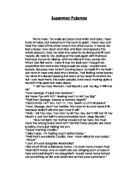
Original Writing, short story

Creative Writing
WJEC GCSE Eng Lang Story Ideas
The Fugitive.
Write about a time when you felt ashamed of yourself.
The Journey of a Lifetime.
Continue the following: ‘Everyone said you should never go back but I could not resist … .'
An Unforgettable Moment.
The Interview.
Write about a time when you broke something.
Write a story that begins: I really wish I had not agreed to this, but there was no going back now.
The long walk home.
A visit to the relatives.
The Traitor.
Write about an incident when you were embarrassed by your friends or family.
A Day at the Seaside.
Write about an occasion when you appeared on stage.
Write a story which begins: He hoped he would have the strength to do what was right.
A Knock on the Door.
Write about a time when you went on a school trip.
Continue the following: ‘There’s no argument about it,’ snapped Mum. ‘We’re going and that’s final.'
Write about a time when you had to stay with a relative.
Write a story which ends with the following: ‘I hadn’t wanted to go but this had made it all worthwhile.'
The Wedding.
Write about a time when you won something.
Continue the following: ‘Some days can only get better.'
The Time of My Life.
Write a story which ends with the following: ‘… and he knew he had made it.'
The new arrival.
Write about a time you were taken out for a treat.
Continue the following: ‘I thought it was a dream come true, but that’s not how it turned out.'
Write a story that ends: ‘… and because I was able to get it back in time, she never did find out.'
Write about a time when a friend let you down.
Trouble in the street.
A fresh start.
Write about a time when you cheated.
Continue the following: ‘It was just a small postcard in the newsagent’s window but it caught my eye.
Write a story that ends with the following: 'Mum sat down heavily, looked at me and said, ‘Well, let’s just hope it never happens again.''
Write a story which ends: ‘… and that wiped the smile off her face.'
The Choice.
Write about a time when you were at a children’s party.
Write a story which begins: ‘I didn’t know if I had the courage to do this ...'
Making a Difference.
Write a story which ends: '… sometimes you have to be careful what you wish for.'
A New Beginning.
Write about an occasion when you had to visit relatives.
Write a story which begins: ‘I wish I had never agreed to this but it was too late to go back now.
A Memorable Journey.
Quick Reply
Related discussions.
- English language and literature WJEC Eduqas
- bad choices
- english gcse help??
- OFFICIAL GCSE Year 10 chat 2024-2025:
- GCSE Results: Post your results
- gcse results - should i retake eng lang
- Uni waiting for GCSE grades
- English literature
- IGCSE English language
- Medical school
- GCSE English Language paper 1
- Asking for help
- Current Year 10 Official Thread (2022-2023)
- Urgent Help!! MEDICINE AND GCSEs
- Gcse requirements for Uni of Nottingham
- Average GCSEs, A* A* A* A-levels, enough for oxbridge medicine??
- What GCSEs did everyone get that got them into Medicine?
- GCSE prep in the summer
- University GCSE minimum requirement help!!!
Last reply 1 week ago
Last reply 3 weeks ago
Last reply 4 weeks ago
Last reply 1 month ago
Posted 1 month ago
Articles for you

Students react after GCSE English Literature Paper 1 on 13 May 2024

Students react after GCSE Computer Science Paper 1 on 19th May 2023

Students react after GCSE Religious Studies Paper 1 on 15 May 2023

Students react after GCSE History Paper 1 on 15 May 2024

IMAGES
VIDEO
COMMENTS
AO6 (16 marks) Use a range of vocabulary and sentence structures for clarity, purpose and effect, with accurate spelling and punctuation. Overview. Question 5 is a writing question. Question 5 is worth 40 marks. You should aim to write 5-7 paragraphs. You should spend approximately 45 minutes on this question.
Unit 2 Reading and Writing: Description, Narration and Exposition gives two prompts to choose between, for an account and an essay perhaps, and Unit 3: Reading and Writing: Argumentation, Persuasion and Instructional sets up a letter, or similar. Jump ahead to WJEC Eduqas non-fiction writing prompts from past GCSE papers.
AQA GCSE titles for creative writing. Subject: English. Age range: 14-16. Resource type: Assessment and revision. These resources are the product of my retirement! After years as a teacher, I tutored. Tackling different exam boards, texts and aspects of English I had to develop lots of materials, which I'm hoping will help those of you still at ...
Chapter 8 . Topic 4. I sing a dead song. It is a song I repeat for infinity, a song of a hopeful journey turned into despair. It is a song of a captain who lost his way. For all humans lose their way on the journey of life, on the voyage of life, in the path through the forest of waves and calm. Up, down, up, down.
The style of the writing (sentence structure and overall structure) is dynamic and engaging; Below you will find a detailed creative writing model in response to an example of Paper 1 Question 5, under the following sub-headings (click to go straight to that sub-heading): Writing a GCSE English Language story; Structuring your story
READ MORE: > 10+ GCSE creative writing ideas, prompts and plot lines Mastering Narrative Structure. A good story has a clear structure - a beginning, middle, and end. The beginning should hook the reader, the middle should build the story, and the end should provide a satisfying conclusion.
II. Desire. [6] Small child really wants cake but has been forbidden from taking it down from the shelf. Start this story with the child lusting after the cake, which you should describe - baking, decorating etc - in delicious detail. [ read a short, very funny version of this here]
High-quality model essays showcase exemplary writing skills, providing inspiration and guidance for crafting outstanding essays . Packed with 500 frequently examined questions and essays . Covers narrative, argumentative, and descriptive essays, directed writing, letters and speech. Perfect for A Level, GCSE, IGCSE, and O Level students
Retold Fable. Prompt: Modernize a classic fable or story, such as the Boy Who Cried Wolf, in a contemporary setting. Potential Story Directions: The story could be set in a modern city, exploring current social issues. It might be told from a different perspective, offering a fresh take on the moral of the story.
Paper 1: Creative Writing. In the exam you're normally given two options: a descriptive piece or a narrative piece. Neither is worth more or less than the other so it's up to you to choose which suits you best. Though describing the same thing for 45 minutes can see a little tough, I'd argue that the description is actually easier than the ...
2 Grade 9 Creative Writing Examples. I recently asked my year 11s to pen a piece of description and/or narrative writing for their mini assessment. I gave them the following prompts: Your school wants you to contribute to a collection of creative writing. EITHER: Write a short story as suggested by this picture:
2) Using 'linguistic devices' to set the scene in your GCSE Creative Writing. Metaphor and simile - metaphors and similes are both ways to introduce comparisons into your work, which is a good way to bring some variety when describing something instead of just listing off more adjectives. Similes are used specifically with the words 'like' or 'as' ("life is like a box of ...
1. HAVE A BANK OF STORY PLOT LINES READY. One of our top tips for any creative writing exam, is to have a bank of easily adapted plot ideas up your sleeve. Time is precious in an exam and you need to spend minimal time thinking, leaving you with the maximum amount of time to crack on with your writing! 2.
ENGLISH LANGUAGE GCSE English Language Component 1 Writing: Approaches and ideas. GCSE. COMPONENT: 1 EXAM LEVEL: GCSE AREA OF STUDY. Prose Writing (AO5, AO6) Key Points: • Learners will be asked to produce one piece of creative writing from a choice of four titles • Learners should be given opportunities to consider what makes a good ...
List of 11 Plus Creative Writing Topics. When it comes to developing creative writing topics and tasks, it's helpful to focus on core themes and emotions that often appear in stories. Here are some areas to consider when building your descriptions: Animals - You can use literary devices like personification, exaggeration, and similes to bring ...
In a hurry, I turned around and limped across the beach, in search of higher ground, with a trail of blood following me. I became drowsy as I stood upon the sandy island, only coming across the occasional palm tree. Dehydration had taken its toll, as I collapsed to the ground with my arms and legs aching.
WJEC GCSE Eng Lang Story Ideas. A. itssammorgan. 10. I struggle with writing stories, as I waste too much time trying to think of ideas, and then when I start one I end up disliking it and starting another. My teacher suggested writing a story that can be adapted to fit more than one title (the exam paper provides five titles, and you must pick ...